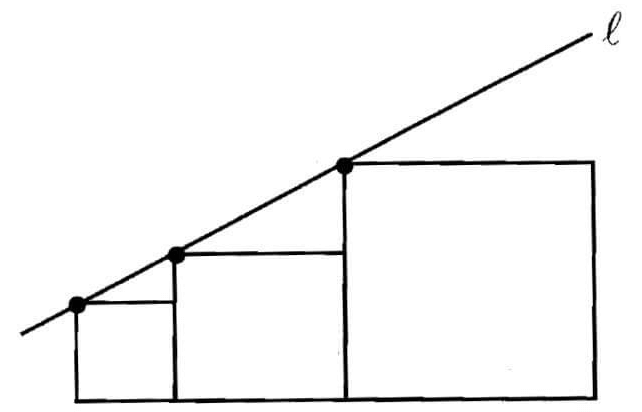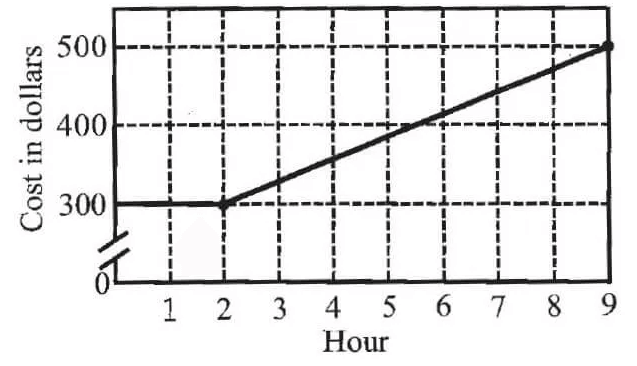HORIZONTAL AND VERTICAL TRANSLATIONS
Translation :
One type of transformation is a translation.
A translation can move the graph of a function up, down, left or right.
Note :
The translation occurs when the location of a graph changes but not its shape or orientation.
In other words, a translated graph is congruent to the original graph.
Vertical and horizontal translations are types of transformations with equations of the forms
y - k = f(x)
y = f(x) + k
Mapping :
Points on the original graph correspond to points on the transformed,
or image, graph. The relationship between these sets of points can be
called a mapping.
Vertical translation :
y - k = f(x)
or
y = f(x) + k
- If k > 0 the translation is up
- If k < 0 the translation is down.
Changes in plotting points :
(x, y) ----> (x, y + k)
Horizontal translation :
y = f(x - h)
- If h > 0 the translation is to the right.
- If h < 0 the translation is to the left.
Changes in plotting points :
(x, y) ----> (x + h, y)
Example 1 :
Sketch the graph of y = |x - 4| + 3.
Solution :
To find the graph of y = |x-4|, we start with the graph of y = |x| (base graph).
By comparing y = x| and y = |x-4|, we see horizontal translation.
Key point :
Here h = 4 > 0, so we move the base graph 4 units towards right side.
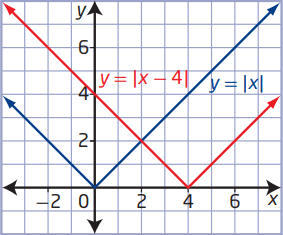
Now to sketch the graph of y = |x - 4| + 3, we take
y = |x-4| as base graph.
Here k is 3 > 0, so we move the graph y = |x-4| 3 units up.
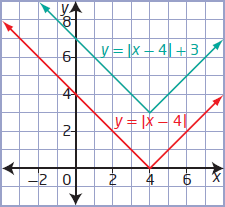
In general, the transformation can be described as
(x, y) → (x + 4, y + 3)
Example 2 :
Describe the translation that has been applied to the graph of f(x) to obtain the graph of g(x). Determine the equation of the translated function in the form
y - k = f (x - h)
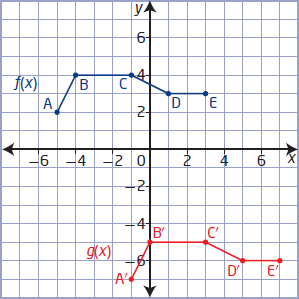
Solution :
|
f(x) A(-5, 2) B(-4, 4) C(-1, 4) D(1, 3) E(3, 3) |
g(x) A'(-1, -7) B'(0, -5) C'(3, -5) D'(5, -6) E'(7, -6) |
By observing x-coordinates of f(x) and g(x),
|
Change in x coordinate : -5 + h = -1 h = 4 |
Change in y coordinate : 2 + k = -7 k = -9 |
h = 4 > 0. So, move the base graph 4 units right side.
k = -9 < 0. So, move the base graph 9 units downward.
y - k = f (x - h)
Applying the values of h and k, we get
y + 9 = f(x - 4)
Example 3 :
What vertical translation is applied to y = x2 if the transformed graph passes through the point (4, 19)?
Solution :
When we apply x = 4 in the base graph y = x2, we get y as 16.
By analyzing the y-coordinate of the given point, we have 19.
16 + 3 = 19
So, the required vertical translation is 3 units up.
Kindly mail your feedback to v4formath@gmail.com
We always appreciate your feedback.
©All rights reserved. onlinemath4all.com
Recent Articles
-
Digital SAT Math Problems and Solutions (Part - 146)
Apr 18, 25 06:52 AM
Digital SAT Math Problems and Solutions (Part - 146) -
Logarithmic Derivative Problems and Solutions
Apr 16, 25 09:25 PM
Logarithmic Derivative Problems and Solutions -
Digital SAT Math Problems and Solutions (Part - 145)
Apr 16, 25 12:35 PM
Digital SAT Math Problems and Solutions (Part - 145)
